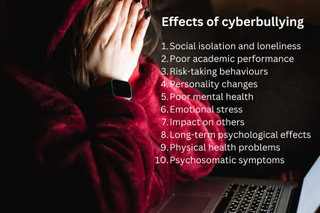10 effects of cyberbullying - and #8 is why parents need to take action
Cyberbullying has long-lasting impacts on kids, teens and even their families and friends. We explore the research and speak to psychological experts to understand the devastating impact of online bullying

Cyberbullying is a growing concern that affects not just children and teens, but also their families and friends. The consequences of online bullying are long-lasting, ranging from emotional distress and social isolation to serious mental and physical health problems.
What our writer learned
I had no idea that cyberbullying could be so pervasive and life-changing for children. It's heartbreaking to hear parents' stories of how their children changed during the period in which they were bullied online. It's so important for us parents to be alert to the signs of cyberbullying and take action as soon as we can.
The impact on our kids can range from skipping school and poor academic performance to low self-esteem and long-term psychological trauma. And you're not alone in worrying about how social media can affect your child's mental health. Ofcom says as much as two-thirds of parents are worried about how to keep kids safe online, while a recent ONS report shows that 1 in 5 children aged 10 to 15 experienced examples of cyberbullying in the past year.
Drawing on expert advice and research, we'll explore the effects of cyberbullying to help you spot the signs your child is being bullied and take action.
What are the effects of cyberbullying?
Cyberbullying has a wide range of serious effects on children and teenagers, impacting their behaviour, their emotional health, and their physical health. A 2021 systematic review of the effects of cyberbullying found that victims often experience social isolation, a drop in academic performance, and changes in personality, such as becoming withdrawn or irritable. Emotionally, they may suffer from anxiety, depression, and even long-term psychological trauma, which can continue into adulthood.

The stress of being bullied online can also affect kids and teens physically, with symptoms like headaches, tiredness, and trouble sleeping. Even people who witness cyberbullying can experience negative mental health effects, making the issue far-reaching and harmful for everyone involved.
Behavioural side effects of cyberbullying
- Social isolation and loneliness: Victims may withdraw from social interactions, avoiding both online and offline activities. This isolation can lead to difficulty forming and maintaining friendships, further contributing to your teen's sense of loneliness.
- Poor academic performance: Cyberbullying often causes a drop in school performance. Victims may have trouble concentrating, lose motivation, and may skip school more frequently, all of which can cause them to struggle academically.
- Risk-taking behaviours: Some children may turn to risky behaviours like substance abuse, dangerous online activities, or even self-harm as a coping mechanism for the emotional distress caused by cyberbullying.
- Personality changes: You might notice your child becoming more irritable, aggressive, or anxious, or you might notice your teen shift from being outgoing to withdrawn or lose their self-confidence. One parent who wishes to remain anonymous recounts how heartbreaking it is to watch a child change from being happy and outgoing to withdrawn. " My child went from being so happy to feeling like she should die because she couldn’t understand why people would target her in such an awful way. She felt like she could do nothing right and nothing could be done about it.”

Emotional effects of cyberbullying
- Poor mental health: Cyberbullying can result in serious mental health problems such as depression, anxiety, and even suicidal thoughts. The anonymity of online platforms can intensify feelings of isolation and helplessness.
- Emotional stress: The constant fear of being bullied online can leave children feeling scared, helpless, and overwhelmed. This emotional distress can lead to heightened anxiety and depression.
- Impact on others: Even bystanders who witness cyberbullying can experience increased anxiety and stress. Those who participate in the bullying may suffer from guilt and social isolation, leading to their own mental health struggles. Parents of children being cyberbullied may have different opinions on how to approach the problem. Mum Rachel describes how she and her partner disagreed when they found out her daughter was being cyberbullied. "He just wanted to beat the living daylights out of the boy involved to teach him a lesson. It caused so much stress in our marriage as I had to ficus on diffusing the situation instead of helping our daughter."
- Long-term psychological effects: The emotional scars of cyberbullying can last into adulthood. Victims may struggle with trust, forming relationships, and suffer from chronic mental health issues like anxiety and depression, sometimes well beyond their teenage years.
Sandra Kushnir, CEO at Meridian Counseling, explains: "The teenage years are a critical period for brain development, particularly in areas responsible for emotional regulation and decision-making.
"When a teen is exposed to relational trauma, such as bullying, the brain's stress response system is constantly activated, leading to long-term changes in brain structure and function.
GoodtoKnow Newsletter
Parenting advice, hot topics, best buys and family finance tips delivered straight to your inbox.
"These changes can manifest in various ways, including depression, social anxiety, and in severe cases, suicidal ideation.
"The damage to self-esteem and the sense of self-worth during these formative years can be devastating, leaving lasting scars that may affect the individual well into adulthood.
"Social anxiety can isolate the victim further, creating a vicious cycle that is difficult to break without proper intervention. The long-term trauma inflicted by cyberbullying can ruin lives long past adolescence, leading to mental health issues, relationship difficulties, and struggles with self-worth that persist well into adulthood.”
Mum Rachel describes how cyberbullying affected her daughter. "It started with her being excluded on Snapchat and WhatsApp, then gradually progressed into vicious messages, horrible memes featuring her face and sharing of
Physical effects of cyberbullying
- Physical health problems: Cyberbullying can lead to physical symptoms of stress, including headaches, stomachaches, fatigue, and difficulty sleeping. If the bullying persists, these stress-related health problems can become more severe over time.
- Psychosomatic symptoms: The emotional distress caused by cyberbullying often translates into physical illness. Children may feel poorly more often or appear more tired, which can be signs of an ongoing impact on their overall health. Therapist Kristie Tse explains: “I have seen that cyberbullying infiltrates private spaces through devices, leaving victims feeling isolated and vulnerable. The distress can affect both their emotional and physical well-being. Long-term consequences can be equally devastating, with victims feeling isolated and vulnerable. The pervasive nature of online platforms amplifies the distress, leaving kids questioning their worth and even their safety in their home environments."

Raised in New York City as a first-generation Asian American, Kristie understands the pressure to succeed while staying silent about mental health struggles. With a deep commitment to challenging these beliefs, Kristie empowers others to prioritise their wellbeing and advocate for their needs. As a therapist, Kristie guides high achievers in breaking free from hustle culture and achieving balance without compromising their ambitions, paving the way for a life of ease.

Sandra Kushnir brings over 12 years of rich experience in various capacities within the mental health sector. Her journey has been marked by a dedication to continuous learning and service, which has taken her from launching a successful podcast to teaching in a graduate school program. She has honed her expertise across a broad spectrum of settings, including treatment programs, the Department of Mental Health, and private practice. Her entrepreneurial spirit led her to establish her own company Meridian Counseling, which has grown to a team of over 120 dedicated professionals and services over 8,000 clients throughout California and Utah. Meridian is also a recognised CARF-accredited program and CAMFT-approved CE training program.
Get more advice and information on tackling difficult subjects with your kids, from when and how to talk to your child about sex to how to talk to your kids about porn. Plus, worried your teen has stopped talking to you? Experts share five reasons why this is 'to be expected' and what you can do to help them.
Joanne Lewsley is mum to a tween, and freelance copywriter and editor who creates parenting, health and lifestyle content for evidence-based websites, including BabyCentre, Live Science, Medical News Today and more.